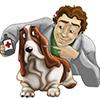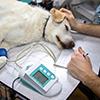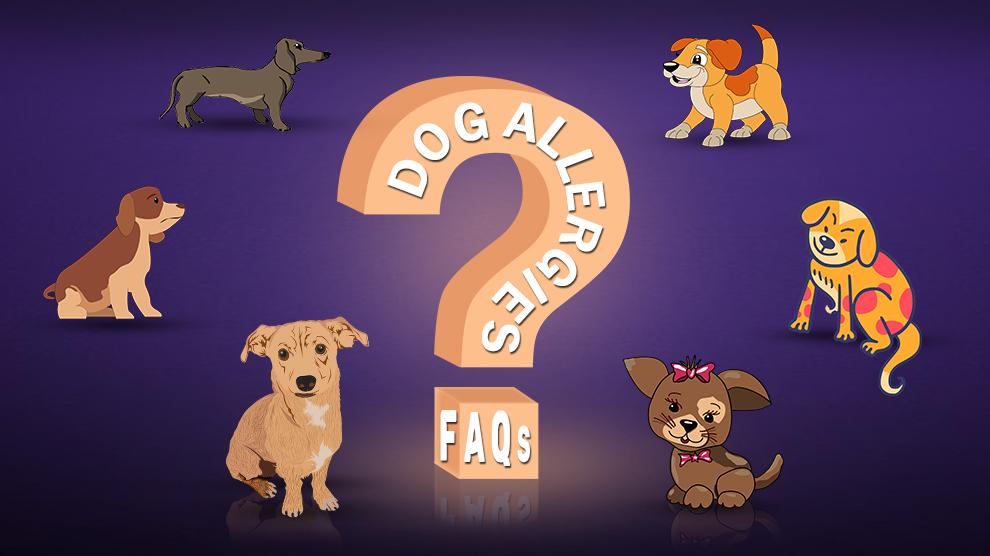What Can I Give My Dog For Allergies?
 For dogs that suffer from allergies, treating with antihistamines is the first way to get relief.
For dogs that suffer from allergies, treating with antihistamines is the first way to get relief.
- Vets generally recommend Benadryl to treat allergic symptoms like hives, sneezing, and itching. Your vet may also prescribe other antihistamines like Claritin or Zyrtec for dog allergies.
- For yeast infections and ear allergies, Apple cider vinegar is used.
- Lauric acid in coconut oil reduces flea allergies.
- You can give an oatmeal bath to dogs that suffer from itchy skin and swollen reddish coats.
- Quercetin can also be given to reduce itching in dogs as it holds antioxidant and antihistamine properties.
Can Dogs Have Allergies?
 Allergies are quite common in all types of dogs. Dogs generally suffer from many types of allergies like environmental allergies, food allergies, seasonal allergies, insect and flea bites, sneezing, coughing, Alabama disease, hives, itching, inflammation, and swelling. Dogs may also be allergic to inhaled allergens.
Allergies are quite common in all types of dogs. Dogs generally suffer from many types of allergies like environmental allergies, food allergies, seasonal allergies, insect and flea bites, sneezing, coughing, Alabama disease, hives, itching, inflammation, and swelling. Dogs may also be allergic to inhaled allergens.
If your dog shows severe allergic symptoms, take him to the vet immediately.
How To Treat Dog Allergies?
 Dogs are prone to many types of allergies.
Dogs are prone to many types of allergies.
- For insect, ticks, or flea bite allergies – the first relief will be Benedryl.
- For allergic reactions to pollens or other inhaled allergens – antihistamines like Benedryl, Claritin, Zyrtec, Quercetin can be given to alleviate itching and cold.
- Excessive skin rashes, dandruff, and greasiness – can be treated with medicated dog shampoos.
- For reddened, moist, and itchy skin spots or most likely ‘hot spot’ that most likely arise from fleas or flea allergy – wash the area with oatmeal-based shampoo to prevent the dog from continuous chewing.
Use Elizabethan collar available with vets as anti-chew preparation. Itching may arise from some harmful underlying diseases. Contact your vet immediately.
How To Help Dog Allergies?
 When your dog suffers from allergies, the following can be done to alleviate the reactions:
When your dog suffers from allergies, the following can be done to alleviate the reactions:
- If your dog needs treatment for allergies, your vet may prescribe steroids or antihistamines like Benedryl.
- Immunotherapy or allergy vaccine shots are another action for better treatment.
- To get rid of the reactions caused by allergies, certain specifically formulated food devised by canine nutritionists can be given.
- Symptoms like sneezing and coughing can be relieved using nasal sprays, bronchodilators, and antihistamines.
- Baking soda combined with water at 50:50 ratios and applied over the itching areas for 10 to 15 minutes can alleviate itching.
Can You Give Dogs Allergy Medicine?
 Dog allergy is a common health condition and is estimated that nearly20% of dogs suffer from allergies, with growing trend.
Dog allergy is a common health condition and is estimated that nearly20% of dogs suffer from allergies, with growing trend.
You can give safe over-the-counter antihistamines like Benadryl, Clariton, Zyrtec, Quercetin that help to reduce allergy symptoms as antecedent medication.
Consult your vet before giving any allergy medicine to your dog.
Can You Build Up An Immunity To Dog Allergies?

- You can add natural supplements like Omega 3 fatty acids, probiotics, and cod liver oil tablets to your dog’s diet to help boost its immune system.
- Coconut oil has certain very useful antiviral and antibacterial properties that are effective for itchy skin and boosts the immune system. You can use it along with fish oil in your dog’s diet.
- Immunotherapy shots are another way to boost the efficacy of the immune system in dogs.
How Much Is A Dog Allergy Test?
 The price of the allergy test for dogs differs with vets and depends on the allergens tested, the location of the clinic, and the vet. On average, the tests may cost around $150 at a clinic. At-home dog allergy test plans are also available. Wherever it is, the cost mainly depends on the number of allergens tested.
The price of the allergy test for dogs differs with vets and depends on the allergens tested, the location of the clinic, and the vet. On average, the tests may cost around $150 at a clinic. At-home dog allergy test plans are also available. Wherever it is, the cost mainly depends on the number of allergens tested.
How To Get Rid Of Dog Allergies?
 Just like humans, dogs do develop allergies. Preventive health care is the most important thing you can give your dog.
Just like humans, dogs do develop allergies. Preventive health care is the most important thing you can give your dog.
- Eliminate and eradicate all the allergens that trigger allergies at the earliest.
- Try to avoid grassy lawns as much as possible as they have the possibility of being disinfected with harmful allergens and they attach to your dog’s claws and paws.
- Clean their paws after walks and clean the coat with a damp cloth.
- Keep your house clean and free of ticks and fleas.
- Try to feed healthy food and snacks as chemical preservatives and dyes are the worst culprits.
- Avoid feeding allergy-causing food like corn, soy, wheat, and any grains.
- Always use only certified allergy shampoo or any allergy lotions prescribed by your vet.
Can Dogs Have Seasonal Allergies?
 Common environmental causes for allergies include pollen, dust mites, various grasses, leaf mold, etc. They are often seasonal. The inhaled allergens more often cause itching in dogs.
Common environmental causes for allergies include pollen, dust mites, various grasses, leaf mold, etc. They are often seasonal. The inhaled allergens more often cause itching in dogs.
The symptoms of allergies to seasonal causes usually appear before 3 years of age. The treatment includes administering antihistamines, glucocorticoids, and hyposensitization therapy.
Can You Give A Dog Benadryl For Allergies?
 Benadryl is used as a primary allergy medication for both cats and dogs. Benadryl (diphenhydramine HCL) is used to treat allergy symptoms like hives, sneezing, and itching. However, this drug causes dizziness and sometimes hyperactivity.
Benadryl is used as a primary allergy medication for both cats and dogs. Benadryl (diphenhydramine HCL) is used to treat allergy symptoms like hives, sneezing, and itching. However, this drug causes dizziness and sometimes hyperactivity.
Always remember that overdosage of Benadryl can be life-threatening if left untreated in dogs.
How Do I Know If My Dog Has Allergies?
 Like humans, dogs can also develop allergies to many things like foods, shampoos, insect bites, medications, environmental influences, etc. Like the human’s main allergy organ is their respiratory tract, a dog’s main allergy organ is its skin.
Like humans, dogs can also develop allergies to many things like foods, shampoos, insect bites, medications, environmental influences, etc. Like the human’s main allergy organ is their respiratory tract, a dog’s main allergy organ is its skin.
The common allergy symptoms include:
- Increased itching, redness or hot spots, hair loss, thickened or scabby skin.
- Frequent ear infections with waxy discharge and itchy ears.
- Continuous licking and chewing the feet and pad
- Excessive licking and scratching belly or genitals
- Vomiting, stomach upset, and diarrhea.
- Discharge from nose or eyes and sneezing.
- Scratching tail head
How To Soothe Flea Allergy Dermatitis In Dogs?
 The most common allergy among all dog breeds is Flea Allergy Dermatitis or FAD. FAD is an allergic reaction a dog shows to the saliva injected by the flea under the skin whenever it feeds.
The most common allergy among all dog breeds is Flea Allergy Dermatitis or FAD. FAD is an allergic reaction a dog shows to the saliva injected by the flea under the skin whenever it feeds.
This causes intense itching not only in the area of bite but throughout the body, especially around the rump, legs, and paws. Even a single flea bite can cause severe reaction to allergy-prone dogs.
Treatment to FAD includes topically applied antibiotics, anti-inflammatories, and medicated shampoos.











